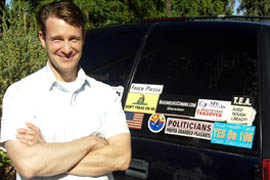- Slug: Proposition 113, 1st Ld-Writethru,650
- Note: SUBS 10th graf to CLARIFY that change federal legislation would involve situations in which 50 percent or more of workers petition for union representation.
- Sidebar: Union membership statistics.
- Photos available (thumbnails, captions below)
By REBECCA L. MCCLAY
Cronkite News Service
PHOENIX – The fate of a ballot measure that would require secret ballots to form unions may hinge on whether voters think unions or employers are bigger bullies to workers.
Proponents of Proposition 113, which would make a secret ballot mandatory after workers petition to form a union, say that without confidentiality employees are vulnerable to pressure to join in.
“Employee intimidation is wrong,” said Lucy Caldwell, spokeswoman for the Arizona chapter of Save Our Secret Ballot, a Las Vegas-based nonprofit that is spearheading the effort here and in other states. “We think a secret ballot is a fundamental right.”
Opponents of the ballot measure, including the AFL-CIO and Arizona Education Association, say it’s the employers who will intimidate workers in the time required to conduct a secret vote.
“We hear a lot about union harassment – of the harassment of employees to form a union,” said Andrew Morrill, president of the Arizona Education Association. “Nobody seems to be talking about the kind of harassment and pressure put on employees not to form a union.”
So far, Save Our Secret Ballot has contributed more than $623,000 to the effort to pass Proposition 113, including a $100,000 cash infusion on Sept. 13, according to a campaign finance report. It’s backing similar measures in South Carolina, South Dakota and Utah.
As a 501(c)(4) nonprofit, the organization doesn’t have to disclose its donors, and Caldwell declined to list them.
The first step to forming a union is taking an open census, or petition, to gauge employees’ level of interest. Currently, if 30 percent of employees sign in support of a union, the National Labor Relations Board then holds a secret ballot.
If 50 percent of employees sign the petition, then a union can be recognized immediately unless either the employees or an employer requests a secret ballot vote.
Proposition 113 is a move to counter proposed federal legislation called the Employee Free Choice Act, that would eliminate the option of a secret ballot altogether when 50 percent or more of employees petition for union representation. Instead, the National Labor Relations Board would recognize a union immediately.
Caldwell said the labor groups likely are desperate to block Proposition 113 because unions would boost their numbers – and income – significantly if the bill becomes law.
“What they’re not telling workers is that this is a way to grow their political budget,” Caldwell said. “That’s really what’s at stake here. It doesn’t have to do with workers’ rights.”
Morrill said the motivation behind Proposition 113, which was put on the ballot following a special legislative session and would be embedded in the state Constitution, is “largely political.”
“It seems to protect a secret ballot,” he said. “And that seems all well and good until you begin to peel back the layers and you find out that there’s already a process in place for recognition of the unions. It involves a secret ballot.”
Rebekah Friend, executive director of the Arizona AFL-CIO, called the measure a “knee-jerk reaction” to potential congressional action and said it could trigger lawsuits against the state over conflicts with a federal law.
“If this is passed, there’s going to be an expensive lawsuit,” she said.
Tom Jenney, state director for the Arizona Chapter for Americans for Prosperity, which is backing Proposition 113, said the proposition is indeed designed to conflict with the potential federal law. Supporters expect lawsuits, he said, and are aiming to debate the issue in court.
Jenney said eliminating secret ballots could put a financial strain on small businesses.
“The economic reality is that worker productivity drives up wages,” he said. “If unions come in and artificially push up wages, they’re not increasing productivity.”
^____=
Facts about union membership:
– In Arizona, union membership was 7.9 percent in 2009, representing 194,000 workers. that’s a drop from 9.8 percent of the workforce in 2008, representing 254,000 workers.
– National union membership was 12.3 percent in 2009.
– Older workers are more likely to be in unions. Workers ages 55 to 64 had a 16.6 percent union membership rate versus 4.4 percent membership for workers ages 16 to 24.
Source: U.S. Department of Labor
^___=

Tom Jenney, state director for the Arizona Chapter for Americans for Prosperity, which is backing Proposition 113, said a union push to eliminate secret ballots could put a financial strain on small businesses. (Cronkite News Service Photo by Rebecca L. McClay)

Andrew Morrill, president of the Arizona Education Association, a union representing educators, said Proposition 113’s push to guarantee secret ballot for organizing unions could subject workers to harassment from businesses. (Cronkite News Service Photo by Rebecca L. McClay)